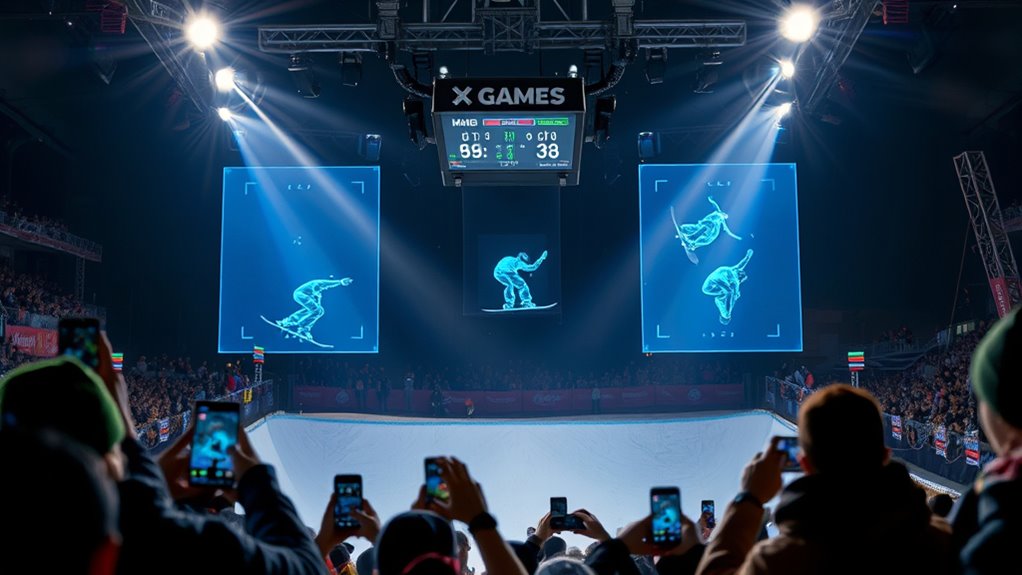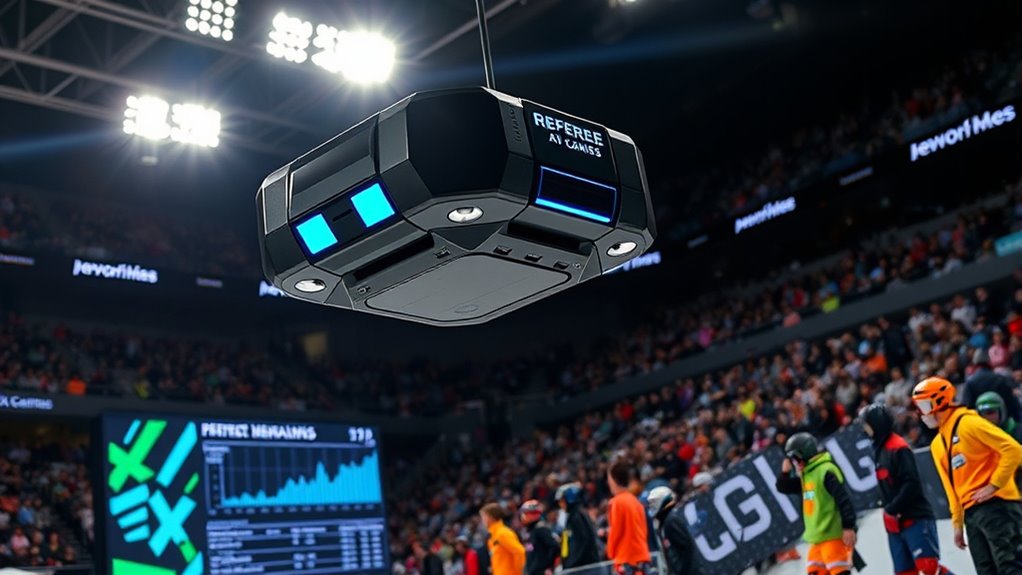At the X Games, an innovative AI referee now predicts winners and aims to make judging fairer and more transparent. You’ll see it analyzing performances in real time, evaluating complex tricks instantly, and reducing human bias. The system works alongside human judges, ensuring results are consistent and objective. It also addresses ethical concerns like athlete privacy. Keep exploring to discover how this technology is transforming sports judging and what it means for the future.
Key Takeaways
- X Games introduces an AI referee to analyze performances and predict winners with greater accuracy.
- The AI system enhances fairness and transparency while reducing human bias and errors in judging.
- It processes real-time data from videos, sensors, and athlete records for instant performance assessment.
- The AI functions alongside human judges, ensuring a collaborative, ethical, and privacy-conscious approach.
- This innovation signals a shift toward integrating technology to improve sports officiating and spectator trust.

The X Games has introduced an innovative AI referee system designed to enhance fairness and accuracy in competitions. This new technology uses advanced algorithms to analyze athlete performances in real time, predicting winners with a level of precision that surpasses traditional judging. As you watch the action unfold, you might wonder how this system impacts the integrity of the sport and whether it truly benefits athletes and fans alike. Rest assured, the developers have prioritized AI ethics and data privacy to address these concerns. They’ve implemented strict guidelines to guarantee that the AI operates transparently and fairly, avoiding biases that could skew results or undermine trust.
The X Games’ AI referee enhances fairness and accuracy through transparent, unbiased real-time performance analysis.
You’re likely curious about how the AI makes its predictions. It processes vast amounts of data—video feeds, sensor inputs, previous performance records—quickly and accurately. By doing so, it can instantly assess complex maneuvers, jumps, spins, and other elements that are traditionally judged subjectively. This reduces human error and emotional bias, leading to more consistent and objective results. Still, some skeptics worry about over-reliance on machines, fearing that AI might overlook nuance or human artistry. The developers have addressed this by designing the system to complement, not replace, human judges, providing a balanced approach that leverages technology without undermining the sport’s human element.
Data privacy remains a critical issue in deploying such AI systems. The developers have taken extensive measures to safeguard all athlete data collected during competitions. They encrypt sensitive information and restrict access to authorized personnel only. Transparency about data use is a core principle; athletes are informed about what data is collected, how it’s stored, and how it’s used to improve the AI’s performance. By prioritizing data privacy, the system aims to build trust among athletes, coaches, and fans, ensuring that personal information isn’t exploited or mishandled. Additionally, implementing secure data protocols aligns with best practices for data privacy and security.
You’ll also notice that the AI referee’s predictions are presented alongside traditional judging, not as a replacement. This hybrid approach helps maintain the excitement and unpredictability of competitions while increasing fairness. Athletes now have more confidence that their performances are judged objectively, and spectators can enjoy the event knowing technology is helping uphold standards. The integration of AI into sports judging signals a future where technology and human expertise work hand in hand, with careful attention paid to ethical considerations and data privacy rights. As the X Games pioneers this innovation, it sets a precedent for other sports to follow, aiming for fairness, transparency, and respect for athletes’ privacy.
Frequently Asked Questions
How Accurate Is the AI Referee Compared to Human Judges?
You might wonder how accurate the AI referee is compared to human judges. While the AI can analyze data quickly and reduce bias concerns, its accuracy depends on data transparency and quality. If the data is all-encompassing and unbiased, the AI can be very reliable. However, human judges still excel at understanding nuance and context. So, the AI is a helpful tool but not infallible, especially if bias concerns or data transparency issues arise.
Can the AI Referee Adapt to Different Sports’ Judging Criteria?
You might wonder if the AI referee can adapt to different sports’ judging criteria, and the answer is yes, but with limitations. It’s programmed to understand diverse standards, yet sports ethics and technological fairness challenge its flexibility. As it learns each sport’s nuances, suspense builds—will it master every sport’s unique essence? The evolving tech hints at a future where AI could seamlessly adapt, but human oversight remains essential for fairness.
What Data Does the AI Use to Predict Winners?
You should know the AI uses video analytics and athlete biometrics to predict winners. It analyzes footage to assess performance details and measures biometrics like speed, strength, and precision. This data helps the AI compare athletes’ actions against established criteria, enabling it to make informed predictions. By combining visual data with biometric metrics, the AI offers a more objective and accurate assessment of who might win.
How Do Athletes and Coaches Feel About AI Judging?
While some athletes and coaches appreciate the innovative approach, they often express cautious optimism about AI judging. They acknowledge the potential for consistent, objective assessments, yet remain mindful of ethical concerns and the emotional impact on competitors. You might feel a mix of confidence and apprehension, as AI could reshape fairness but also challenge traditional values. Overall, they see it as a tool to enhance, not replace, human judgment.
Is the AI Referee Available for Non-X Games Sports Events?
Currently, the AI referee isn’t available for non-X Games sports events. As you consider technology adoption, ethical considerations come into play, especially around fairness and transparency. While AI can enhance judging accuracy, it’s vital to guarantee it’s implemented responsibly. You’ll want to stay updated on developments, as more sports might adopt AI referees in the future, balancing innovation with integrity to improve fairness across all competitions.
Conclusion
As the X Games’ new AI referee takes center stage, it’s like watching a digital oracle illuminate the path to fairness. With every judgment, it weaves a tapestry of precision and innovation, transforming sports into a high-stakes chess match of algorithms and athleticism. This brave new world invites you to imagine a future where human and machine dance together in perfect harmony, rewriting the rules of victory and challenge—where technology becomes both judge and guide in the thrilling arena of sports.










